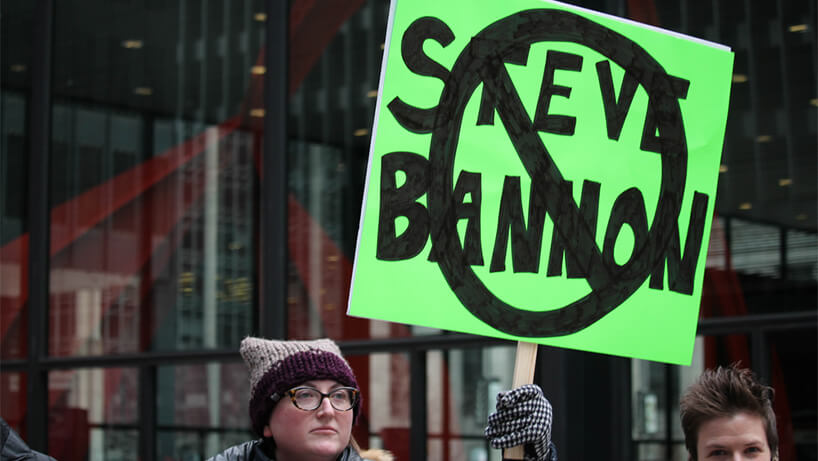When the media company invited Steve Bannon to its annual gathering, some confirmed high-profile speakers backed out of the event. The backlash is a reminder of the difficulty in striking a balance between being edgy with your speakers and crossing the line.
Last week, late-night host Jimmy Fallon, film producer Judd Apatow, actor Jim Carrey, and a number of other celebrities all made the same move: They canceled their appearances at The New Yorker Festival on social media. None of them had unexpected scheduling conflicts during the event’s Oct. 5–7 timeframe. Instead, they took issue with the magazine’s decision to add Steve Bannon to the speaker program at the annual gathering in New York City.
Bannon — best known for his role as former executive chairman of Breitbart News and his time as chief strategist in the Trump White House — is, to put it mildly, a controversial figure. I personally feel the need to say at the outset that I disagree with everything on Bannon’s agenda, and that I find the alt-right to be synonymous with racism and hatred. I also subscribe to The New Yorker, and my political views fit under the liberal umbrella.
As plenty of other people beneath that umbrella voiced disgust over Bannon’s name on the program, David Remnick, the magazine’s editor, edited his own decision. “I don’t want well-meaning readers and staff members to think that I’ve ignored their concerns,” Remnick wrote in a statement about disinviting Bannon from the event. “I’ve thought this through and talked to colleagues — and I’ve re-considered. I’ve changed my mind. There is a better way to do this. Our writers have interviewed Steve Bannon for The New Yorker before, and if the opportunity presents itself I’ll interview him in a more traditionally journalistic setting as we first discussed, and not on stage.”
A Dinner Party Vs. Dissenting Voices
Was Remnick’s attempt at a course correction the right move? Who’s to say? I found author and New Yorker staff writer Malcolm Gladwell’s reaction insightful for those involved in organizing conferences. “Call me old fashioned,” he wrote on Twitter after Remnick’s announcement. “But I would have thought the point of a festival of ideas was to expose the audience to ideas. If you only invite your friends over, it’s called a dinner party.”
Think about the number of conferences and conventions that promise “three days of networking with like-minded peers from your industry.” That marketing message is front and center on many event websites. The downside of that aim for like-mindedness is that it can create an environment where everyone shares the same opinion. Everyone applauds everyone else. Disagreements are rare.
That’s not exactly an idea exchange. The most valuable events are not those that support all of an attendee’s existing beliefs; they are the ones that may challenge some of those notions and send them home with a deeper understanding of what’s happening in the world that will impact them. Bannon would definitely upset me. I wouldn’t want to go to a dinner party with him. But I believe I should know what he’s thinking, so I can better articulate my argument against his perspective.
The New Yorker isn’t the only publication in a stew over Bannon. The Economist has him on the program for the magazine’s Open Future festival on Sept. 15, and its editor, Zanny Minton Beddoes, is not backing down. He has said that he will not follow Remnick’s move to dis-invite Bannon.
“The future of open societies will not be secured by like-minded people speaking to each other in an echo chamber, but by subjecting ideas and individuals from all sides to rigorous questioning and debate,” Minton Beddoes wrote in a statement titled “The Open Future Festival and Steve Bannon.” “This will expose bigotry and prejudice, just as it will reaffirm and refresh liberalism. That is the premise The Economist was founded on. When James Wilson launched this newspaper in 1843, he said its mission was to take part in ‘a severe contest between intelligence, which presses forward, and an unworthy, timid ignorance obstructing our progress.’ Those words have guided us for 175 years. They will guide our debates at the Open Future festival on September 15th. That is why our invitation to Mr Bannon will stand.”
Should Speakers Have a Say Before They Appear on Stage?
These editors both faced a challenge that all event organizers must confront: What content will resonate with prospective attendees? And what might be too controversial for them to stomach? Those answers depend on what their audiences want and how daring an organization is willing to be. However, The New Yorker dilemma brings up another important question that doesn’t always come to mind when curating a program: What will the other speakers think?
Consider how Jack Antonoff, the lead singer of rock band Bleachers, who was also on The New Yorker agenda, framed his initial decision to ditch his scheduled appearance. “Found out about Bannon’s inclusion when you did,” he tweeted to his 151,000 followers. “I would have appreciated to make a decision on this before it was announced. I would ask The New Yorker to consider in the future that participants in the festival deserve to make a choice to appear alongside someone this hateful.”
What do you think? Replace Bannon’s name with one that might feel especially uncomfortable for your audience. Would you invite him or her? And would you run it by the other speakers on your program first for consideration? Go to Catalyst to share your thoughts.

